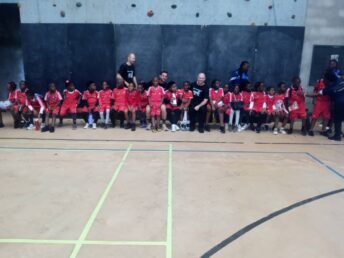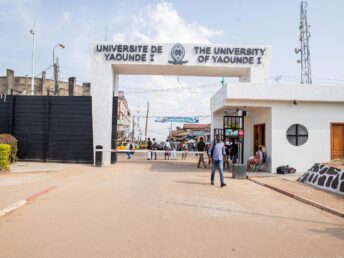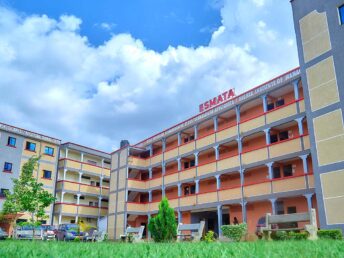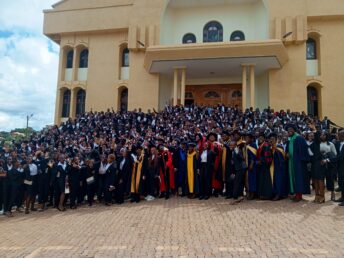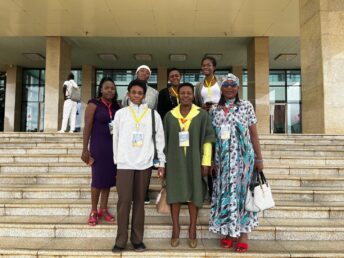If you are looking for the Best universities in Yaoundé, you’ve come to the right place. Yaoundé is the educational hub of Cameroon — it is home to many top‐ranked public and private universities that offer a wide range of programs, strong academic traditions, and growing research opportunities. With more students finishing high school every year, the demand for higher education rises fast. You want to choose a university that matches your goals, gives good value, and prepares you well for your future career.
In this guide, you will find the top 10 universities in Yaoundé. You will learn about what each school offers, what makes each special, and what you should consider before making your decision. By the end, you will feel more confident to pick the university that fits you best — whether you want medicine, engineering, humanities, or business. Let’s go on this journey together so you can find a university that helps you grow, succeed, and make your dreams real.
Why Study in Yaoundé?
You may ask: why choose Yaoundé when there are many cities in Cameroon. Here are strong reasons you should consider studying in Yaoundé — one of the places where higher education in Yaoundé really shines, especially among the top universities in Yaoundé and other universities in Cameroon.
- Access to more resources: As the capital city, Yaoundé has good libraries, research labs, Internet, and infrastructure. You will often find partnerships, guest speakers, seminars, internships more easily here than in smaller towns.
- Diverse programs and languages: You can find programs in French, English, or bilingual. Yaoundé’s universities offer courses from sciences, medicine, law, business, ICT, to arts. You have more options to pick something you love.
- Career and networking opportunities: Being in the capital means you are nearer to government institutions, NGOs, businesses, embassies. This gives you chances for internships, meeting professionals, and finding job paths.
- Cultural and social life: Yaoundé is a lively city. You will interact with students from many regions. There are cultural events, clubs, and student life that help you grow personally.
- Recognized diplomas and credentials: Many of the best universities in Yaoundé are well recognized in Cameroon and abroad. Studying here can open doors if you want to work internationally or pursue further studies.
List of Top 10 Best Universities in Yaoundé
Below are some of the Best universities in Yaoundé. Each has strengths, programs, and unique features. Use this to compare and choose what fits you best.
-
University of Yaoundé I (Université de Yaoundé I):
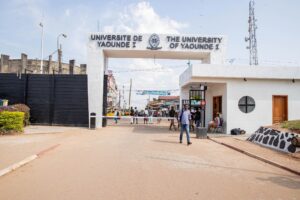
Founded in 1962, the University of Yaoundé I (UYI) is located at Ngoa Ekele and is one of the oldest and most respected public universities in Cameroon. It bilingual as it offers courses in both French and English. It is well known for strong teaching, research, and for being among the top public institutions in higher education in Yaoundé and one of the best in west Africa.
Why it is among the best:
Because of its large range of faculties, the quality of its academic staff, research output, and international recognition. UYI appears in international rankings, and is known for good laboratory facilities and high standards in both sciences and humanities.
Programs offered (bachelor’s, master’s, professional schools):
UYI offers Bachelor, Master, and Doctorate (PhD) programs. Faculties include Arts, Humanities & Social Sciences; Sciences; Medicine & Biomedical Sciences; Education/Teacher Training; Engineering (through its National Advanced School of Engineering) and more.
Admission insights for students:
Admissions are competitive. You often need good grades in secondary school, pass any required entrance exams, especially for professional and medical programs. Be aware of language requirements (French and/or English) depending on the faculty.
Unique feature (research, partnerships, career prospects):
UYI has many research labs (e.g. in molecular biology, nanotechnologies, environment), which gives you chances to participate in research. It also has good networks with national and international institutions. Graduates are often well‐placed for further study or work, especially in Cameroon or other French/English speaking African countries.
2. ICT University (ICT-U)
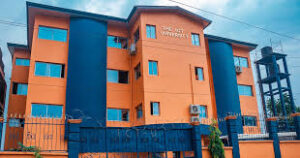
ICT University is a private institution founded in 2010. Its core mission is to impart Information & Communication Technology (ICT) skills across disciplines. It is younger than many others but growing fast, especially in tech and managerial fields.
Why it is among the best:
Because of its focus on modern technology, blended teaching (online + in-person), and relevance to current job markets. If you like cutting-edge ICT, software, networking, or business technology, this university is strong.
Programs offered (bachelor’s, master’s, professional schools):
It offers Bachelor, Master, PhD programs. Some of its available fields are Software Engineering, Telecommunication, Information Systems & Networking, Business Management, Applied Statistics, Development Planning, and specialized diplomas and certifications in ICT-related areas.
Admission insights for students:
You’ll need to apply through their admissions process, show your previous academic transcripts, sometimes take entrance tests depending on the program. Because it’s private, fees are higher than public universities, so consider affordability and look for scholarships or financial aid if available.
Unique feature (research, partnerships, career prospects):
A strong point is the professional certifications (e.g. Cisco, Microsoft) offered, as well as the iMBA and hybrid / online options. The university keeps up with modern technology demands, which helps students get jobs or practical experience.
3. Catholic University of Central Africa (Université Catholique de l’Afrique Centrale – UCAC)
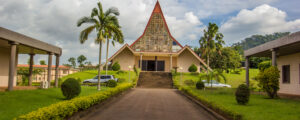
UCAC is a private Roman Catholic university in Yaoundé founded in 1989. It is known for combining academic excellence with ethical values, and has grown over time with multiple campuses in and around Yaoundé.
Why it is among the best:
UCAC is respected because it offers a quieter, value-driven educational environment. It has good teaching faculty, firm principles, and often smaller class sizes. If you prefer more personalized attention, this can be helpful.
Programs offered (bachelor’s, master’s, professional schools):
UCAC has faculties including Theology, Philosophy, Social Sciences & Management, Health Sciences, Nursing, and an engineering / technology school. They offer undergraduate (Bachelor) and postgraduate (Master, sometimes PhD) programs.
Admission insights for students:
Admission usually depends on previous academic results. Private universities sometimes require higher fees, and possibly additional fees or interviews. Make sure you check UCAC’s specific requirements for the field you want.
Unique feature (research, partnerships, career prospects):
UCAC often emphasizes ethics and community engagement, which can be attractive if you want more than just academics. It also seeks partnerships, especially for its health sciences and management programs, which can help in internships and future job placement.
-
University of Yaoundé II – Soa (Université de Yaoundé II)
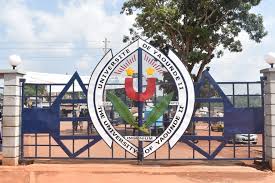
The University of Yaoundé II-Soa was created on 19 January 1993, by presidential decree. It is one of the State universities that resulted from splitting the old University of Yaoundé. It is located just outside Yaoundé in Soa and has several campuses.
Why it is among the best:
Because of its strong profile in social sciences, legal studies, economics, management, international relations, communication and information technologies. It is known for good academic staff, varied faculties, and infrastructure (including a new digital development center). If you care about quality education in law, governance, media, or diplomacy, this institution ranks high among the universities in Yaoundé.
Programs offered (bachelor’s, master’s, professional schools):
Offers Bachelor, Master, and Doctorate programs via faculties such as Legal & Political Sciences (FSJP), Economic & Management Sciences (FSEG); ESSTIC (Information & Communication); IRIC (International Relations); IFORD (Demography & Research) etc.
Admission insights for students:
Admission often depends on your high school diploma (Baccalaureate or equivalent), grades, possibly entrance requirements for certain faculties. Because it is public, competition is strong especially for popular faculties. Also, deadlines are set by the Ministry of Higher Education and the university itself.
Unique feature (research, partnerships, career prospects):
One unique feature is its new Digital Development Center, aimed at enhancing digital teaching, distance learning and giving access to technological resources to students. Also, its institutes like IRIC and ESSTIC have international recognition, producing graduates in diplomacy, journalism, communication. Strong potential for career paths in government, NGOs, media, international relations.
-
École Nationale Supérieure Polytechnique de Yaoundé (ENSPY)
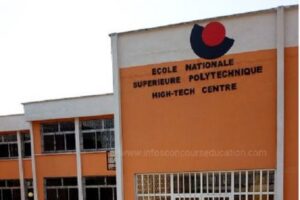
ENSPY was founded on 4 June 1971. It is the national advanced engineering school attached to University of Yaoundé I. Its mission is to train high-level engineers (“ingénieurs de conception”) and to contribute to national research in engineering fields.
Why it is among the best:
Because it is the reference in engineering within Cameroon and even the CEMAC sub-region. It has a long history of producing skilled engineers, strong academic reputation, good links with industry, and increasing international partnerships (e.g. double degree agreements).
Programs offered:
Offers engineering cycles (five years) in specialties like computer engineering, civil engineering, electrical engineering, industrial engineering, telecommunications, mechanical engineering, meteorology etc. Also postgraduate cycles (Master / PhD) in some of these fields.
Admission insights:
Admission is by competitive examination. You can enter after scientific Baccalaureate (for first year) or via licence/scientific degree (for advanced years). The number of spots is limited (e.g. ~200 for first year). The competition is tough, especially in science & engineering streams.
Unique feature:
ENSPY is notable for strong research labs, good engineering design, and international collaborations (like with Télécom Paris for double degree). Also, its high standard engineering education gives good employability.
-
Protestant University of Central Africa (UPAC)

UPAC (« Université Protestante d’Afrique Centrale ») is a private, faith-based institution founded in 1989. It started from a Protestant Theology Faculty and has grown to include other disciplines. Located in Djoungolo, Yaoundé.
Why it is among the best:
You may prefer it if you want a private university environment with smaller class sizes, a strong ethical component, comfortable student housing, and modern infrastructures. It offers quality education in various fields with recognized accreditation.
Programs offered:
Offers undergraduate and possibly postgraduate programs. Faculties include Theology & Religious Studies, Social Sciences & International Relations, Information & Communication Technology, etc. Also offers lodging (mini-campus) for students.
Admission insights:
Admission requires your secondary school diplomas, transcripts, and may involve application dossiers, possibly interviews, depending on the program. Since it is private, fees are higher than public universities. Consider costs, possible scholarships.
Unique feature:
UPAC has its own student housing (mini cité universitaire) which helps students from outside or foreigners. It has partnerships in theology, social sciences, and has good academic governance. Its faith-based identity may appeal to some students.
-
ESSTIC – Ecole Supérieure des Sciences et Techniques de l’Information et de la Communication

ESSTIC was established originally in 1970 as the École supérieure internationale de journalisme de Yaoundé (ESIJY). Later nationalized and renamed several times, it now covers journalism, media, communication and information sciences. It is part of University of Yaoundé II. Located on the Ngoa Ekélé campus.
Why it is among the best:
If your passion is media, journalism, public communication or information documentation, ESSTIC is among the top in Yaoundé. It has produced many of Cameroon’s leading journalists, broadcasters etc. It offers high quality education and training in communication and information disciplines.
Programs offered:
Provides Licence, Master programs in journalism, radio/TV, print media, cyber-journalism; also specializations in communication, advertising, documentary/information documentation, information sciences. Offers continuous training, and e-learning/seminar formats.
Admission insights:
Requires secondary school diploma, may have prerequisites (language, writing skills). For competitive programs like journalism, you may need portfolio or tests. Being part of a public university helps with cost, but demand is high.
Unique feature:
ESSTIC has double supervision (Ministry of Higher Education & Ministry of Communication), giving it a specialized profile. It is known for modernizing its offer, embracing digital media and communication technology. Graduates often move into media, public relations, NGOs.
-
International Relations Institute of Cameroon (IRIC)
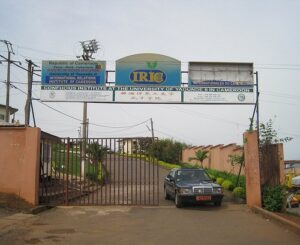
IRIC was created in 1971 (by presidential decree) and is an institution under University of Yaoundé II. It was originally focused on training diplomats, but now offers broader international relations and diplomacy programmes.
Why it is among the best:
If you want a career in diplomacy, international organizations, foreign affairs, IRIC is one of your best options in Yaoundé. It has a strong reputation, good faculty, connections, and has adapted its course offerings over the years.
Programs offered:
Diplomas in international relations, possibly Masters, bilingual instruction (French & English often). Some courses in global affairs, diplomacy, international law / policy.
Admission insights:
Admissions often require strong grades, proficiency in languages, interviews or selection, possibly competitive entry. Also, IRIC being public may have lower fees than private schools, but high expectations academically.
Unique feature:
IRIC’s international recognized profile, focus on diplomacy and global affairs, strong network for careers in foreign service, NGOs, embassies. Also its location (Obili, Yaoundé II) gives access to governmental institutions.
-
Private Universities & Specialized Institutes
Since there are many Instituts Privés d’Enseignement Supérieur (IPES), we decided to highlight a few.
Private institutes in Yaoundé offer specialized and professional training in business, management, health, technology, etc. Examples include ICT University (private, strong in ICT and managerial fields), Yaounde international business school (YIBS) located at Carrefour Simbock, ESMATA located at pon Emana, INUSCASTY located at Scalom, HAVARD located at Carrefour Obili and others such as Higher Schools of Commerce, Institutes of Technology & Management. They are typically more flexible, smaller class sizes, more practical focus.

Why they can be among the best:
Because they offer career-oriented programs, respond faster to market needs, often have more modern or specialized facilities, and sometimes easier admission with more frequent intakes. If you are focused on technology, management, or applied fields rather than purely academic research, these institutions might serve you well.
Programs offered:
Depends on institute: some offer Higher National Diploma (HND), Professional Bachelor's, Bachelor, Master programs. Fields: ICT, business, health, communications, technology, hospitality etc. For example, ICT University offers Diploma, Bachelor's, Master, PhD; MEHIT offers HND, Bachelor, professional vocational training.
Admission insights:
Usually based on secondary school certificate, possibly entrance exams or portfolio, or interview depending on the institute. Fees are higher than public, but might be more affordable than foreign options. Some private institutes offer scholarships or payment plans. Always check approval by the Ministry of Higher Education (Minesup) to ensure diploma is recognized.
Unique feature:
Flexibility (schedules, e-learning), quicker adaptation to industries, partnerships with private sector, sometimes smaller class sizes, specialized labs or tools relevant to the field. If you want to enter workforce sooner, this path might suit you.
-
FINISTECH University Yaoundé (Fobang higher institute of science and technology)
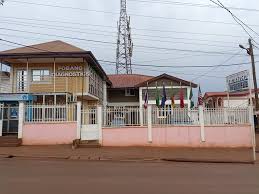
The FINISTECH University is currently a major known private university by that exact name. This private professional higher education institute is located at Carrefour Simbock Yaoundé, focused on health, technology, business, applied sciences.
Also FINISTECH University is affiliated to the University of Bamenda and offers health, engineering and applied tech training.
Why it is among the best:
Because these institutes offer practical, hands-on training, modern facilities, focus on employability, and often smaller class sizes than large public universities. If you want a career in health, technology or applied fields, FINISTECH University can be strong options.
Programs offered (bachelor’s, master’s, professional schools):
FINISTECH University offers HND/BTS, Bachelor’s, Master’s programs in fields like health, technology, management, ICT, applied sciences.
FINISTECH University offers engineering / technician courses, industrial maintenance, sandwich programs combining classroom & work-placement.
Admission insights for students:
You’ll need your secondary school diploma, sometimes specific science/technical backgrounds for certain tracks. Private institutes often have more frequent intake, maybe less rigid quotas, but fees are higher. Always check if the institute is approved/licensed by Cameroon’s Ministry of Higher Education (Minesup).
Unique feature (research, partnerships, career prospects):
FINISTECH University emphasizes innovation, has flexible payment, e-learning options and career workshops.
FINISTECH University benefits from being affiliated to the University of Bamenda.
Also read on Private vs Public Universities in Cameroon
How to Choose the Right University in Yaoundé
When you pick a university in Yaoundé, the right choice is personal. Here are tips to help you decide well:
- Think about your career goals:
What do you want to do after graduation? If you aim to be an engineer, a researcher, a diplomat, or work in media, choose a university strong in that field. The quality of the program matters more than just the name. - Check your budget and costs:
Public universities are usually more affordable than private ones. For example, some public universities in Cameroon charge as little as ~50,000 XAF/year for undergrad. Private universities or specialized institutes tend to cost more.
Also, consider living costs: accommodation, meals, transport, materials. All add up. - Program quality & reputation:
Look for universities that are recognized by the state (Ministry of Higher Education), have good faculty, modern labs, and good success rates for graduates. Rankings, reviews, or word-of-mouth help. Check also if they offer internships or partnerships with industry. - Language & teaching mode:
Yaoundé has bilingual universities (French & English). If you are stronger in one language, or wish to study in English/French, that is important. Also, some universities offer blended learning (online + in-person) which can help with flexibility. - Location & facilities:
If you live in Yaoundé, proximity matters (transport, housing). If you come from another region or abroad, find out whether there are dorms / student housing. Also see if the campus has good libraries, labs, sports, internet, research centers. - Encourage your own research:
Visit university websites, talk to current students, check their social media, attend open days. Always check the latest admission requirements, deadlines, and fee schedules.
Always choose a university that matches your future career vision. Don’t rush: your choice today can shape where you’ll be tomorrow.
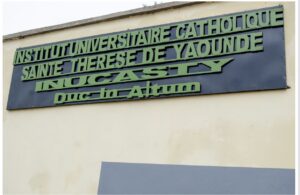
Frequently Asked Questions (FAQ)
Here are some common questions students ask. These should help you make a clear choice.
Q1: Which is the best university in Yaoundé?
There is no single “best” university for everyone. The best one depends on your field of interest, budget, language preference, and what you value most (research, teaching quality, practical training, international recognition). Look at the list of universities, compare what each offers, and choose the one that matches your goals.
Q2: Are Yaoundé universities recognized internationally?
Yes — many universities in Yaoundé follow the LMD system (Licence-Master-Doctorate), which aligns with regional and international standards. Some private and public universities are accredited by the Ministry of Higher Education, and have partnerships abroad. That gives their diplomas more weight internationally.
Q3: How much does it cost to study in Yaoundé?
It depends on whether the university is public or private, which program you choose, and whether you are local or international. Public universities often charge relatively low fees (for example, ~50,000 XAF/year for some programs), while Tuition in private universities or specialized institutes can be much higher FROM 300,OOO TO 1.2 milion. Living and other costs (housing, transport, books) also add up.
Q4: What programs are most popular in Yaoundé universities?
Common popular programs include medicine & health sciences, engineering & technology, law & political sciences, social sciences & communication, business & management, and information & communication technologies (ICT). Universities offering quality practical training and strong faculty tend to attract many students.
Q5: Can international students study in Yaoundé?
Yes. Many Yaoundé universities accept international students. You’ll need to meet admission criteria (secondary education qualifications, proof of language proficiency in French or English depending on the institution), possibly show legal documents (passport, visa), and pay tuition fees (sometimes higher than nationals). It helps to contact the admissions office in advance to know what you need.
Also read on 12 Best Secondary Schools in Cameroon
Studying in Yaoundé gives you access to many opportunities: quality education, varied programs, and the chance to build networks. The Best universities in Yaoundé all offer something valuable — whether you want strong research, practical skills, or ethical values. contact bigmanschool career orientation team today for a more tailored advise on which University suits you.
You deserve a university that fits who you are and what you want to become. Take your time, compare your options, and listen to your future career vision. Your choice today can shape your career tomorrow.


